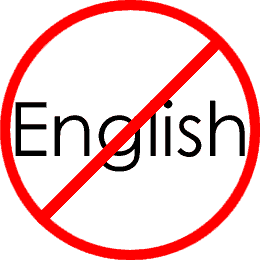When knowing English doesn’t matter
Medical Pharmaceutical Translations • May 4, 2015 12:00:00 AM

When it comes travel or business, a lot of people say there’s really only one language you need to get by: English. It may seem like they have a point: with its adaptability and relative easiness to learn compared to other major world languages like Mandarin or Arabic, English has become a lingua franca. In addition to its estimated 300 million+ native speakers, according to some sources, more than 1 billion people speak it (with varying degrees of fluency) as a foreign language.
But despite all that, there are times when knowing English, to quote classic Saturday Night Live character Matt Foley, “won’t amount to jack squat”. Here are some examples:
– When things get really local.
Sure, an impressive amount of the world’s population speaks English, but not everyone does. This is true even in major world cities…as I learned the hard way when I got lost in a Tokyo neighborhood and couldn’t find any English-speakers to give me directions. Luckily, I had a dictionary and no shame in making gestures to be understood. Even if you don’t travel, in our global world, you may find yourself trying to communicate with non-English speakers for work, or to buy a product only sold overseas (as my figurine-collecting brother knows very well).
-When accents come into play.
That same trip to Tokyo taught me another important lesson: Even if you find yourself surrounded by Anglophones, if they have strong accents and trouble pronouncing certain sounds, they may as well be speaking a foreign language. And of course, that’s not just the case with English. Here in France, I’m on the other side of things – occasionally I’ll meet someone who just can’t understand what I’m saying, because of the way I’m pronouncing it.
– When you want to show respect.
I firmly believe that before you set foot in a foreign country, you should at least know how to say basic phrases like “Hello”, “Goodbye”, and “Thank you” in the local language. Do this and you’ll see the face of the person you’re speaking to light up: saying even something simple in another person’s language is a huge sign of respect, and it can be a way to have a small, beautiful moment of connection. This same idea can also be useful when you’re communicating with overseas clients or co-workers.
– When things need to be clear.
It’s pretty much always easier to understand something when it’s in your native language. So if you need to be absolutely sure, say, a client understands the terms of a contract, it’s probably a good idea to have a copy of it available in their mother tongue, not just the English version.
– When something gets lost in translation.
Sometimes, an EFL student will say something to me like, “The crowd was important.” Because I speak French, if I realize this doesn’t make sense in the context of what they’re talking about, I know they probably mean “There was a big crowd” — in French, “important” can mean the same thing it does in English, but it can also be used to express a sense of largeness. Knowing another language gives you this important edge of anticipating possible mistakes when a speaker translates their words into English.
Some people might find it frustrating that speaking English doesn’t cover every communication scenario. But think of it as yet another reason to learn another language! Here’s one way to take the first step: a link to aiaTranslations’ language courses! ….Or, if you haven’t got the time or motivation just yet, you can check out our translation and interpretation services!
